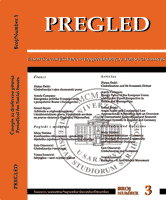Razvoj strategije sigurnosti
Trends in the Development of Security Strategies
Author(s): Alija KožljakSubject(s): Politics / Political Sciences
Published by: Univerzitet u Sarajevu
Keywords: Alliance; asymmetric threats; civilian control; democratic control of the security sector; diplomacy; doctrine; existing security gap; EU; Euro-Atlantic organisations; Cold War; ideologicalpolitical premises; interoperability
Summary/Abstract: Throughout the overall development of society, security has been always accentuated as a social value of exceptional importance. However, with the development of society, new threats which needed to be faced were also generated. Conflicts, wars, conquests of territories, enforcement of ideologies are becoming the forms and means of expressing threats. History has shown that with the emergence of states it is they which are becoming the greatest threats to each other and this, in turn, has rapidly lead to the realization that such threats can be more easily countered by forging alliances and coalitions. It is a similar case with regards to the so-called asymmetric threats, which currently most seriously undermine world security and which have also conditioned changes in the development and functioning of the security strategies. In today’s world of unconventional and hardly predictable threats to security, there is a presence of multifaceted efforts by various factors towards the creation and preservation of a secure and stable environment. These efforts are especially visible in the Euro-Atlantic region, which primarily includes the European and the North American continent. Issues which need to be seriously addressed are whether strategies and doctrines, i.e. ways and means, exist to efficiently intervene on providing protection from various forms of threats to security, preventing mass killings and ethnic cleansings and providing protection from terrorist acts in today’s global security environment. Furthermore, the issue is whether states or international organisations are able and willing to act in this direction and do they want integrations and interactions with security. Considering strategy and security in the field of social sciences, the unavoidability of an interdisciplinary approach can be noted, i.e. the consideration of a broad theoretical basis which takes into account theoretical discoveries in the field of political sciences – international relations and security, this followed by the analysis of military sciences, especially strategy as its leading branch, which has primarily evolved as part of military skill as a science. By discussing security and strategy in general terms, as fields of science, but also as important factors for the study and analysis of security strategies in the Euro-Atlantic region, especially those segments which determine the association and interaction of strategy and security, a solid basis is being created for an improved research and analysis of security strategies of different organisations, alliances and individual states, from their inception, development, all the way to the creation of modern security strategies. Keeping in mind all these findings, the existence and consideration of a firm scientific basis on contemporary theories of security strategies, which try to reach new information and facts important for this issue, is vital.
Journal: PREGLED - časopis za društvena pitanja
- Issue Year: XLIX/2008
- Issue No: 3
- Page Range: 175-195
- Page Count: 21
- Language: Bosnian

